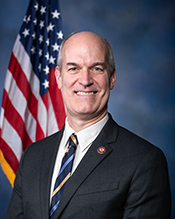H.R. 3477: Ensuring Airline Resiliency to Reduce Delays and Cancellations Act
This bill, known as the Ensuring Airline Resiliency to Reduce Delays and Cancellations Act, aims to improve the operational resilience of certain air carriers to minimize flight disruptions. Here are the key components of the bill:
Operational Resiliency Strategy
The bill mandates that the Secretary of Transportation require designated air carriers (referred to as "covered carriers") to create and regularly update a strategy designed to limit the impact of various disruptions on their operations, particularly those that affect passengers. This strategy must be developed within one year of the bill's enactment.
Components of the Strategy
Each operational resiliency strategy must include:
- Assessment of Disruptive Events: An evaluation of how severe weather and other anticipated events could impact the carrier's operations and what measures are in place to mitigate these effects on passengers.
- Staffing Models: Analysis of how disruptive events may affect staffing, ensuring there are plans for rescheduling passengers and managing flight crews and operations staff effectively.
- Technology Preparedness: Examination of the carrier's current information and technology systems, including crew scheduling systems, to ensure they can continue functioning during disruptions.
- Cybersecurity Measures: Strategies to address known cybersecurity risks and vulnerabilities that could lead to operational disruptions.
- Additional Consumer Protections: Any other issues identified by the Secretary that may protect consumers and support the stability of the airline industry.
Confidentiality of Information
The Secretary of Transportation will develop a method to keep confidential any trade secrets or proprietary information included in the operational resiliency strategies submitted by the air carriers.
Evaluation of Effectiveness
Within three years of the bill’s enactment, the Comptroller General of the United States will audit the effectiveness of the resiliency strategies implemented by the covered carriers. Following the audit:
- Feedback will be sought from the carriers regarding the audit findings.
- A report summarizing the audit's findings will be submitted to relevant congressional committees within one year of the audit's completion.
Limitations of Authority
The bill clarifies that it does not grant any extra authority to the Secretary of Transportation beyond what is necessary to require the development and update of the operational resiliency strategies. However, it allows the Secretary to assess and provide guidance for these strategies.
Definition of Covered Carrier
The term "covered carrier" refers to the specific air carriers defined in the regulatory framework, which may include larger airlines operating in the United States.
Relevant Companies
- AAL (American Airlines): Likely to be affected as it will need to develop and update its operational resiliency strategy to comply with the bill.
- DAL (Delta Air Lines): Would need to assess its current operations and implement measures as specified by the bill.
- UAL (United Airlines): Similar obligations to create a resiliency strategy can impact its operational procedures and policies.
- LUV (Southwest Airlines): Will be required to address potential flight disruptions through the development of a detailed strategy.
This is an AI-generated summary of the bill text. There may be mistakes.
Sponsors
3 bill sponsors
Actions
6 actions
| Date | Action |
|---|---|
| Jun. 11, 2025 | Committee Consideration and Mark-up Session Held |
| Jun. 11, 2025 | Ordered to be Reported by the Yeas and Nays: 57 - 7. |
| Jun. 11, 2025 | Subcommittee on Aviation Discharged |
| May. 18, 2025 | Referred to the Subcommittee on Aviation. |
| May. 17, 2025 | Introduced in House |
| May. 17, 2025 | Referred to the House Committee on Transportation and Infrastructure. |
Corporate Lobbying
0 companies lobbying
None found.
* Note that there can be significant delays in lobbying disclosures, and our data may be incomplete.













